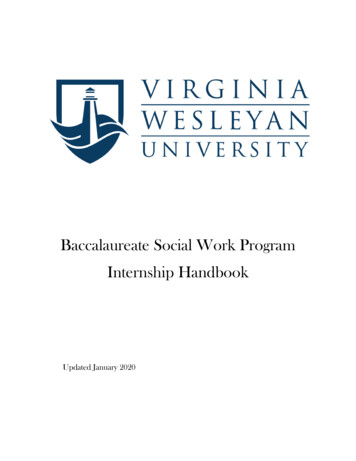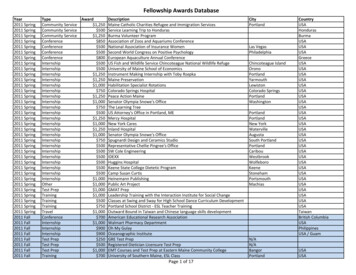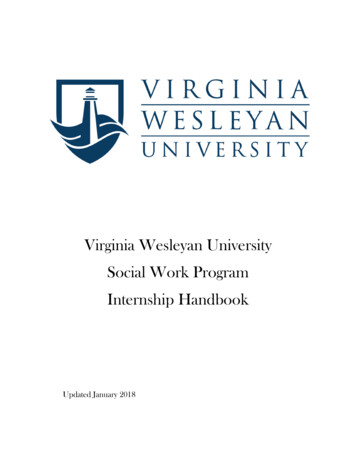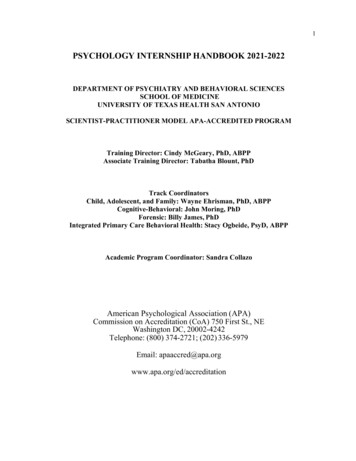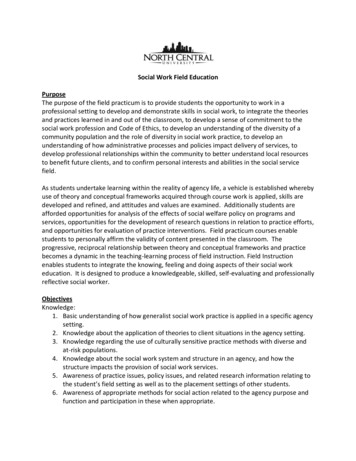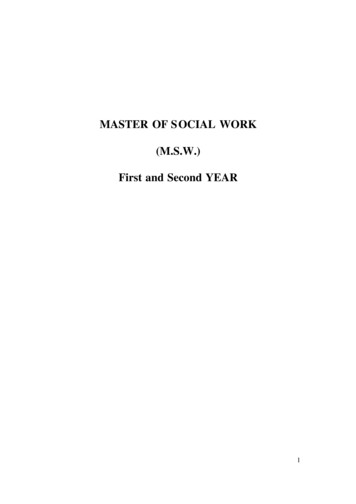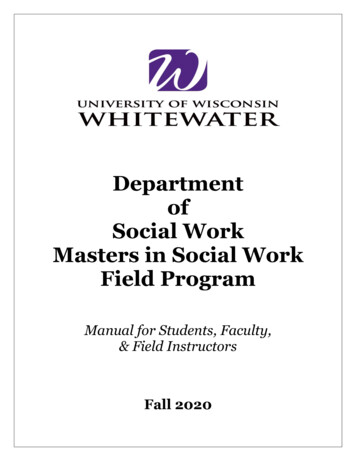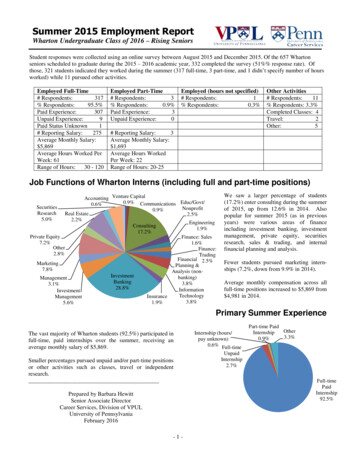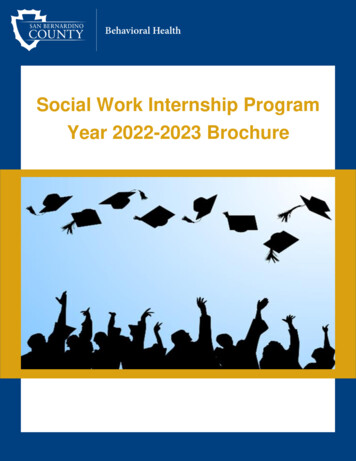
Transcription
Social Work Internship ProgramYear 2022-2023 Brochure0
ContentsAbout the Department of Behavioral Health . 2Social Work Internship Program Overview . 3Micro (Clinical) Practice Placements . 3Macro (Community) Practice Placements . 4Training . 4Supervision . 4Individual Supervision . 4Group Supervision . 5Internship Locations . 5Schedules . 5Compensation . 6Paid Positions . 6Unpaid Positions . 6Eligibility Requirements . 6Application and Selection Process. 6Positions After Internship . 7Covid-19 Response . 7Contact Information . 81
About the Department of Behavioral HealthThe San Bernardino County Department of Behavioral Health (DBH) is acomprehensive community mental health organization that provides a full range ofmental health services to the approximately 2,000,000 residents in the largest county (inarea) in the continental 48 states. The Department encompasses several outpatientclinics, clinical programs, and over 1,000 employees throughout the county. DBHservice providers include Social Workers, Marriage and Family Therapists, ClinicalPsychologists, Psychiatrists, Nurses, Occupational Therapists, Case Managers, MentalHealth Specialists, and Student Interns. Outpatient, forensic, and day treatment servicesare provided in the Department's multiple community-based clinical sites, includingneighborhood and outlying Department regional centers and detention facilities, as wellas through sites contracted with various local private agencies and providers.As an organization, the Department of Behavioral Health adheres to the communitymental health philosophy, including early treatment of emotional disorders, providingservices in non-clinic locations when appropriate, and responsiveness to changingcommunity needs. California uses the "Recovery Model" for delivery of MediCal/Medicaid services, emphasizing services for those in acute need, the severely andpersistently mentally ill, and "at-risk" children and families. The Department continues tomake progress in implementing a "mental health recovery" philosophy of care, whichemphasizes optimism regarding client improvement, assistance with basic resourceneeds, client empowerment, reintegration into the community, and the value of clientself-help. Outpatient services involve a strong emphasis on brief treatment and grouptreatment, though student interns may have the opportunity to work with some clientsfor the entire internship year. A wide range of theoretical orientations and approachesare found among our staff, including Psychodynamic, Cognitive-Behavioral, Humanistic,Family Systems, Eclectic/Integrative, Solution-Focused, Play Therapy, MotivationalInterviewing, and more. The Department is committed to the multi-disciplinary teamapproach, and student interns will gain experience working alongside those of otherdisciplines as part of a services team.Department of Behavioral HealthMission StatementSan Bernardino County Behavioral Health Programs strive to be recognized as aprogressive system of seamless, accessible and effective services that promoteprevention, intervention, recovery and resiliency for individuals, families and communities.2
Social Work Internship Program OverviewThe Social Work Internship Program offers a wide variety of learning opportunitiesthrough internships within the Department of Behavioral Health (DBH) to Bachelor ofSocial Work (BSW), 1st and 2nd year Master of Social Work (MSW), and AdvancedStanding Social Work students. Internship placements are designed to fit studentinterests, meet local universities' objectives, and enable students to achieve proficiencyin the core Social Work Competencies identified by the Council on Social WorkEducation: Demonstrate Ethical and Professional Behavior Engage Diversity and Difference in Practice Advance Human Rights and Social, Economic, and Environmental Justice Engage in Practice-informed Research and Research-informed Practice Engage in Policy Practice Engage with Individuals, Families, Groups, Organizations, and Communities Assess Individuals, Families, Groups, Organizations, and Communities Intervene with Individuals, Families, Groups, Organizations, and Communities Evaluate Practice with Individuals, Families, Groups, Organizations, andCommunitiesMicro (Clinical) Practice PlacementsThe Social Work Intern Program offers opportunities for interns to gain a wide range ofclinical experience with adults, children, and families. Under the guidance and supportof highly trained and experienced staff, interns gain experience in the following: Triage and initial screening Crisis assessment and intervention Clinical assessment and diagnosis (MSW only) Individual, family, and group therapy (MSW only) Case management and complex care coordination Participation in a multi-disciplinary team Collaboration with professionals at other agencies such as Probation, LawEnforcement, and Children & Family Services Linkage and referral to additional community programs and supportsCaseloads vary with the readiness of the student, but most interns in clinical settingsbuild up to 7 to 10 client hours per week. Interns may also be placed in programs thatprimarily provide services in a community setting which involves working with crisisresponse and homeless outreach teams.“This internship enabled me to gain first-hand exposure to working in the real world. It alsoallowed me to harness the skill, knowledge, and theoretical practice I learned in school.” Former BSW Intern3
Macro (Community) Practice PlacementsThe Social Work Intern Program offers opportunities for interns to gain a wide range ofmacro practice experience in the following: Community outreachPsychoeducation and stigma reductionPrevention and early interventionFacilitation/ co-facilitation of community stakeholder groupsResearchDevelopment and presentation of trainingsStaff recruitment and retentionProgram planning and evaluationPreparation of state-required reportsLeadership and administrationPolicy developmentTrainingAll interns attend a 2-week orientation and training session to the Social Work InternshipProgram from the Social Work Intern Program Supervisor and additional DBH staff.Trainings and topical discussions are ongoing components of group supervision. Internswill also receive training from their field instructors. Although training styles vary, theprocess may include job shadowing, reverse job shadowing, reading assignments, andother training methods. In addition, the Department offers excellent live and onlinetrainings on an ongoing basis, covering various topics, that the interns are welcome toattend with the approval of the Intern Program Supervisor.SupervisionInterns receive a combination of individualand group supervision from their fieldinstructor and Intern Program Supervisor.All field instructors meet the qualificationsset forth by the Council on Social WorkEducation and undergo specializedtraining in the provision of social worksupervision. Individual and GroupSupervision sessions are included in theintern's weekly 16 -20 hour schedule.Individual SupervisionInterns receive individual supervision fromtheir assigned field instructor. Interns workcollaboratively with their field instructors todevelop an individualized learning plan.Although supervision styles vary,supervision typically includes client casediscussion, documentation review,4
professional identity development, and exploration of legal and ethical standards.Group SupervisionInterns attend group supervision sessions at the Internship Program office located inSan Bernardino with the Intern Program Supervisor and program cohort. Groupsupervision provides the opportunity to receive support from peers and gain experiencein professional case presentation. At various points throughout the internship year,guest presenters attend group supervision sessions to provide training on clinicalinterventions and theoretical orientations, discuss programs and services in theDepartment of Behavioral Health, or provide information about potential adjunctivereferrals/resources in the community.Internship LocationsSelected interns are placed in clinics and programs located throughout San BernardinoCounty, including: East Valley (Loma Linda, Redlands, San Bernardino, Yucaipa)Central Valley (Colton, Rialto)West Valley (Chino, Ontario, Rancho Cucamonga, Upland)High Desert (Adelanto, Apple Valley, Hesperia, Victorville, Barstow).Outpatient programs serve their surrounding communities which consist of adults,children, and families. In addition, some DBH programs offer specialized services, suchas field-based and intensive programs to these communities. At the interview,applicants are asked to identify which geographical areas they are willing to be placedin and whether they can accept placement in a field-based program. Declining to acceptplacement in a field-based setting will not preclude applicants from being offered aninternship position in another DBH setting.SchedulesInterns are expected to complete 16-20hours a week for seven months to oneyear with the exception of holidays andother requested time off. Typically, internson a 16-hour schedule work two full days,and interns on a 20-hour schedule worktwo full days and one half-day.5
CompensationPaid PositionsThere are a set amount of paid internship positions available each year. Interns areexpected to work 16 – 20 hours per week at an hourly rate that is authorized andupdated annually. Interns are paid bi-weekly for hours worked during each pay period.The Department does not provide health insurance for interns but does provide worker'scompensation coverage and 24 hours of sick leave coverage in a fiscal year uponworking 90 days.Unpaid PositionsUnpaid internship placements are available but vary in number from year to year basedon the availability of placement sites. Students can apply in the same manner as for thepaid positions. The student should indicate if they are available for an unpaid positionshould the paid positions be filled when submitting their application. Unpaid interns areexpected to work 16 - 20 hours a week and will receive the same supervision,experience, and training available to the paid students.Eligibility Requirements Applicant must be enrolled in a BSW or MSW program. Applicant must have adequate malpractice insurance provided by their university orthemselves. The applicant's university must have full accreditation from the Council on SocialWork Education. Applicants can confirm their university's current accreditationstatus at the CSWE ry-of-Accredited-Programs.aspx Applicant's university must have an existing standard contract with DBH or bewilling to enter one.Application and Selection ProcessStudents need to submit an application form and resume to apply to the program.Application forms and instructions can be found on our DBH website:https://wp.sbcounty.gov/dbh/careers/"This internship year was a great experience and a testament to what it means to be acontributing team member." - Former BSW Intern6
The application period is open from February through the second Friday of March forthe Fall cohort. Requests for alternate start dates must be discussed with the InternshipProgram Supervisor. The application deadline is the second Friday of March.Interviews are conducted mid-March through early April by the Social Work InternProgram Supervisor and additional interview panel members. Internship position offersare made by mid-April.Chosen applicants will have to complete the hiring and background process through theDBH Human Resources department before their start date. Interns begin internshiporientation around the third week of August (specific dates are provided at the time ofinterview).Positions After InternshipWhile DBH does not guarantee being hired after completing the internship, theDepartment is committed to hiring applicants who previously completed an internship atDBH. An internship in the Social Work Internship Program provides valuable experienceand training that uniquely prepares participants for success within multiple clinical,program development, and administrative positions within the Department.Covid-19 ResponseDBH takes the health and safety of its employees and clients seriously and has workedclosely with the Public Health Officer and medical staff to establish safety proceduresfor each clinic. As a result, DBH will continue to monitor public health situations and willmake policies to protect the public and employees accordingly. Additionally, theinternship program works closely with university partners and other county programs todetermine the best way to balance the needs for intern safety, training, and communitycare. All staff, including interns/practicum students, are required to be vaccinated orobtain a medical or religious exemption to provide services. Individuals with anexemption are required to undergo weekly testing and wear masks in all settings.Vaccinated employees are required to wear a mask when they are working with thepublic. The policies regarding vaccination are expected to continue indefinitely. Policiesregarding masking will continue to follow CDC and State guidelines. Vaccines, testing,and masks are provided at no cost to employees or interns.“I was able to apply what I had learned in everyday situations and was challenged in apositive way to grow and seek different solutions.” - Former MSW Intern7
Contact InformationIf you would like more information about the program, feel free to contact:Social Work Intern ProgramCounty of San BernardinoDepartment of Behavioral Health1950 S. Sunwest Ln., Ste. 200San Bernardino(909) 252-4017internprograms@dbh.sbcounty.govSarah Hayes, LCSWSocial Work Internship Program Supervisor(909) 252-4044shayes@dbh.sbcounty.gov8
Social Work (BSW), 1st and 2nd year Master of Social Work (MSW), and Advanced Standing Social Work students. Internship placements are designed to fit student interests, meet local universities' objectives, and enable students to achieve proficiency in the core Social Work Competencies identified by the Council on Social Work Education:
